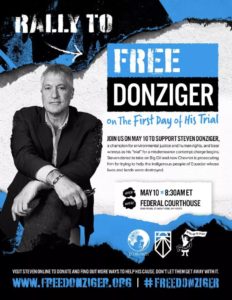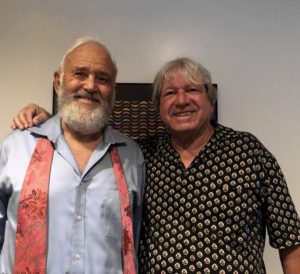Podcast: Play in new window | Download
Steven Donziger Trial: Continued Coverage
As we continue our coverage of human rights lawyer Steve Donziger’s criminal contempt trial, we look back to the origins of case he brought against Chevron Oil. They go back to the late 1960s when Texaco first discovered oil in part of an Amazon rainforest in northeastern Ecuador. The US oil company went on to lord over decades of environmental destruction on a monolithic scale, dumping two or three Exxon Valdez’s worth of oil and toxic byproducts and despoiling an area the size of Rhode Island. Since then, the indigenous tribes in the area have been victims of by cancer and other illnesses caused by the pollution, they say. In 1993, two years after graduating from Harvard Law School, Donziger joined a lawsuit seeking to force Texaco to clean up the mess. In 2000 Chevron purchased Texaco. They spent upward of $1 billion in legal fees defending this case.
Donziger has broad support from celebrities, including Alec Baldwin and Susan Sarandon; dozens of Nobel laureates; and thousands of lawyers and law students globally. A handful of sympathetic Democratic lawmakers, including U.S. Rep. Alexandria Ocasio-Cortez, have written a letter to U.S. Attorney General Merrick Garland, asking him to look into the case. More than 200 attorneys with the International Association of Democratic Lawyers have filed a judicial complaint asking for Judge Kaplan to be taken off the bench.
Conversely, Chevron claims Donziger’s supporters are being duped by a con man. A few conservative outlets have reiterated that narrative. One National Review headline criticized the “Lefty Media” for championing the cause of “History’s Champion Scammer.”
Guest – Attorney Martin Garbus, one of three pro bono lawyers representing Donziger in an attempt to get his law license restored. Garbus has a long and distinguished career as a civil rights and first amendment litigator.
—-
Above The Law: How Qualified Immunity Protects Violent Police
The 1967 judicially created doctrine of qualified immunity has been so broadly interpreted that it acts as a shield for policeman in all but the rarest of circumstances. Only when the exact same abusive behavior of a cop has already been deemed unconstitutional by a court in the exact same jurisdiction can a victim succeed in a civil lawsuit against an abusive police officer. A plantiff must show that government officials violated clearly established law to receive damages for harm.
The plaintiff wins only if a prior court found an official liable under a nearly identical fact pattern. This standard is virtually impossible to meet and the protections promised under section 1983 civil rights act are therefore largely symbolic.
Guest – Ben Cohen – cofounder and former CEO of Ben & Jerry’s Ice Cream. He is the founder of a variety of advocacy organizations and the author of several books including his latest titled Above The Law: How Qualified Immunity Protects Violent Police. Ben and his partner Jerry Greenfield are currently helping to lead the campaign to end qualified immunity.
—-
USPS Announces Closing Of 19 Mail Processing Plants
The US Postal Service advertises the official standard of delivering first-class mail — a typical letter with a 55-cent stamp—within “1-3 business days.” The News Department at WGBH Radio in Boston conducted its own test to see if this still holds true. News reporters and producers sent nearly 100 letters from different places in the metro area at various hours on the same day to their pick of correspondents in 38 states, creating a random sample. The letters were addressed to residents of large cities, suburbs and small towns. The Postal Service flunked the test. A little more than half of the letters arrived within the three-day window.
Slower delivery is just the tip of the Post Office’s problems. Things are going from bad to worse. The Postal Service issued a report titled Delivering for America calling for a reorganization that highlights something called shared sacrifice.
Many consider it an austerity plan to cover for de facto privatization. Critics say the plan will slow the mail, raise prices, and cut services. Since the report was published, the Postal Service announced the closing of 18 mail processing plants that will take place before November. Based on recent history, closing these plants will slow the mail and guarantee there will be problems with mail delivery during the peak season.
Guest – Chuck Zlatkin, legislative director of the New York Metro Area Postal Union.
—————————-





